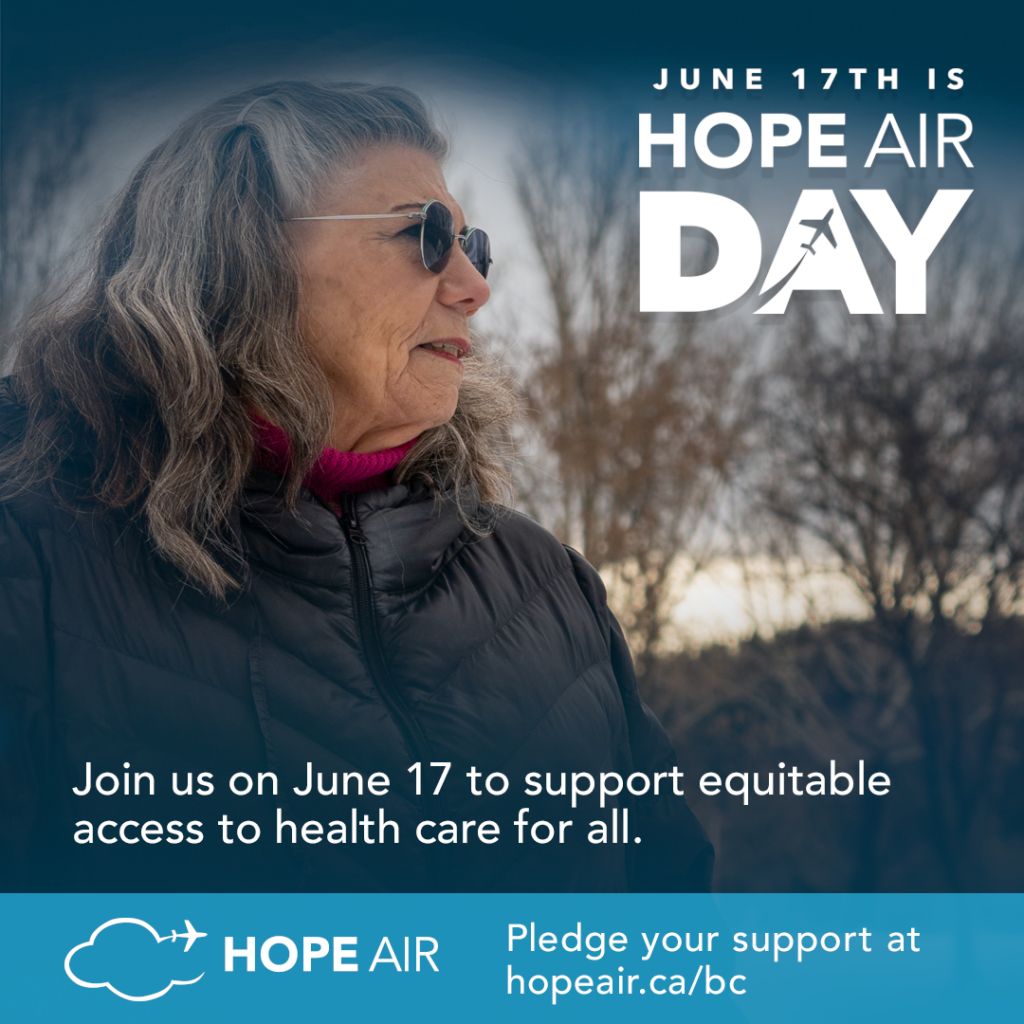June 17th Declared Hope Air Day in British Columbia

Equitable Access to Health Care celebrated throughout rural, remote and underserved communities across the province.
Hope Air Day brings together communities, health care professionals, government, volunteers and Hope Air partners and donors, acknowledging the ongoing and growing need for medical travel supports for patients who must travel far to reach important health care. In 2023, Hope Air supported over 14,000 travel arrangements – including free airline, ground transportation, hotel and meals – for patients travelling to reach medical care far from home. Hope Air assisted patients and their caregivers in over 196 communities across the province.
On Hope Air Day, cities such as Prince George, Oliver, Port Alberni and Masset among many others, will issue proclamations confirming the unique role played by Hope Air in ensuring that B.C. patients receive equitable access to health care, far from home. Hope Air is a critical and essential service that ensures that thousands of patients each year can connect to early diagnosis and treatment on a timely and cost-free basis. Hope Air supports patients for all health conditions including cardiac, cancer, respiratory, mental health, diabetes and a wide ranging of pediatric illness.
The celebration of Hope Air Day will culminate in an event to be hosted in Prince George on June 17th, B.C, featuring a keynote address by Jennifer Rice, Parliamentary Secretary for Rural Health and MLA for North Coast. This event will also feature patients and Hope Air volunteer pilots who fly into Prince George for this celebration.
Hope Air Day recognizes the outstanding commitment of the Government of British Columbia, to ensure that every resident can connect to the health care they need, regardless of distance or financial means. Through funding provided to Hope Air on annual basis, patients can travel to medical appointments at no cost.
“The Province of British Columbia represents the highest level of commitment to equitable access to health care for its residents” said Mark Rubinstein, Chief Hope Officer. “Early diagnosis and treatment for health conditions lead to dramatically better health outcomes for patients. That is why fully funded medical travel programs, as provided by Hope Air, are so critical to people’s health and well-being”
Backgrounder
Quotes:
As Executive Director of the BC Rural Health Network, I see firsthand the transformative impact of Hope Air’s services. By providing essential travel support, they ensure that rural residents can receive timely medical care, ultimately saving lives and improving health outcomes.”
-Paul Adams, Executive Director, BC Rural Health Network
“Hope Air is such a grace, such a relief for anyone in a situation like mine. I had no other choice but to pay for my travel before Hope Air’s support.”
-Rob V., Hope Air Patient from Houston, BC
“It was so awesome and easy… the only stress was that I had never used it before, but everything was flawless. We appreciate that we stayed in a safe area of Vancouver, where everything in the city, including the hospital, was accessible.”
– Amanda, Mother to Hope Air patient Tori from Williams Lake, BC
To learn more visit hopeair.ca/bc
For More Information:
Jodi Lumsden
Director of Marketing & Communications
Tel. 647-688-5634
Jlumsden@hopeair.ca
We acknowledge that we live and work on the unceded, traditional territories of many Indigenous peoples. We are grateful for the privilege of being on lands that these peoples have nurtured since time immemorial.
Exigences de mise à jour des connaissances:
- Au moins 50 heures en tant que commandant de bord sur un avion et 30 heures comme CdB
au cours des 12 derniers mois. - Au moins un vol transnational dans les 90 derniers jours
- Au moins 3 heures comme CdB sur type dans les 90 derniers
jours - Doit satisfaire aux exigences de mise à jour des connaissances des pilotes de Transports Canada: https://tc.canada.ca/fr/aviation/delivrance-licences-pilotes-personnel/garder-ses-connaissances-competences-pilote-jour
Veuillez noter que tous les pilotes bénévoles doivent être entièrement vaccinés contre la COVID-19.
Pour toute question ou préoccupation, veuillez contacter Andrew Knight à aknight@hopeair.ca
Coordonnées
[wpforms id=”10162″ title=”false”]
[wpforms id=”10164″ title=”false”]
[wpforms id=”7772″ title=”false”]
[wpforms id=”7621″ title=”false”]
[wpforms id=”7616″ title=”false”]
[wpforms id=”7593″ title=”false”]
[wpforms id=”7585″ title=”false”]
[wpforms id=”6240″ title=”false”]
[wpforms id=”3576″ title=”false”]
[wpforms id=”3571″ title=”false”]
[wpforms id=”3560″ title=”false”]
[wpforms id=”3513″ title=”false”]
Recency Requirements:
- At least 50 hours PIC on aircraft and 30 hours PIC in the past 12 months
- At least one cross-country flight in the last 90 days
- At least three hours PIC on type in the last 90 days
- Must satisfy the Transport Canada Pilot Recency Requirements: https://tc.canada.ca/en/aviation/licensing-pilots-personnel/staying-current-proficient-pilot
Please note, all volunteer pilots must be fully vaccinated for COVID-19.
For questions or concerns, please contact Andrew Knight at aknight@hopeair.ca
Contact Information
[wpforms id=”3488″ title=”false”]
[wpforms id=”3273″ title=”false”]